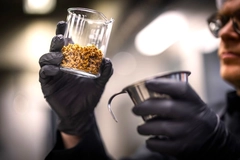
- Industry news
Industry news
- Category news
Category news
- Reports
- Key trends
- Multimedia
- Journal
- Events
- Suppliers
- Home
- Industry news
Industry news
- Category news
Category news
- Reports
- Key trends
- Multimedia
- Events
- Suppliers

Working with numerous partners in the food industry PreventASe has demonstrated its potential to significantly mitigate the formation of acrylamide whilst leaving the nutritional properties of food products unaffected.
14/07/08 DSM Food Specialties has introduced a complete portfolio of application-specific and tailor-made PreventASe solutions. PreventASe is now available in three formulations covering specific food applications under the following sub-brands: Panna, Bicra and Xtru.
PreventASe has been successfully received by the market since its launch in 2007. Fostered by growing customer interest DSM Food Specialties now introduces a range of tailor-made solutions and continues to lead in acrylamide mitigation technology in a variety of food applications, including biscuits, crackers, snacks, (French or potato) fries and bread (products). PreventASe Panna has been specifically developed for wheat based products including bread, biscuits and crackers. PreventASe Bicra has been formulated for specific subcategories of biscuits. Finally, a tailor-made solution for extruded snacks has been developed as PreventASe Xtru. PreventASe and its brand extensions can now increasingly be used by food manufacturers throughout the EU and equally in the US and around the world.

Working with numerous partners in the food industry PreventASe has demonstrated its potential to significantly mitigate the formation of acrylamide whilst leaving the nutritional properties of food products as well as the browning and taste aspects unaffected. The update of the ‘Acrylamide Toolbox’ by the European food and drink industry association (CIAA) – published on 4th December 2007 – highlights the feasibility of the industrial application of the enzyme ‘asparaginase’ for acrylamide mitigation in biscuits at industrial scale. DSM’s PreventASe enzyme is an ‘asparaginase enzyme preparation’ that is commercially available and has been proven to be commercially viable.
“The first successes of PreventASe in the biscuit industry were very encouraging and strengthened our belief that tailor-made solutions are vital to be able to support our customers in implementing acrylamide mitigation technology for their specific food applications. Our specific PreventASe application knowledge, together with our alliances with leading food companies developed into a complete portfolio of tailor-made solutions” says Alexander Wessels, Business Group Director of DSM Food Specialties.
Judith Heikoop, New Business Development Manager PreventASe of DSM Food Specialties added: “Further work on a variety of other food applications such as fries and potato based snacks have led to the development of a portfolio of PreventASe solutions that is tailored to the needs of our customers, their food products and their production processes. This PreventASe portfolio is now commercially available for a wide variety of food products and applications throughout the EU and the US.”
Earlier this month PreventASe also received approval from the Joint FAO/ WHO Expert Committee on Food Additives (JECFA), endorsing the dossier by independent scientific experts that advice the Codex Commission and its specialist committees. This latest authorisation follows earlier authorisations by the French and Danish authorities in 2007; and the recent approval from the Federal Office of Public Health in Switzerland for the use of PreventASe as a processing aid in June 2008. DSM Food Specialties is currently in the process of obtaining approval on a global level. The receipt of a letter of non-objection to the GRAS status of PreventASe by the US Food and Drug Administration in 2007 is expected to be followed by further timely approvals by the Australian and Canadian authorities. The latter already gave DSM’s application priority status.
PreventASe is proven to be able to mitigate the formation of acrylamide in certain foods by as much as 90%. The PreventASe enzyme is a so-called “asparaginase enzyme preparation” from the Aspergillus niger micro-organism (A. niger). The enzyme basically converts one of the precursors of acrylamide, asparagine, into another naturally occurring amino acid, aspartate. As a result, asparagine is not available anymore for the chemical reaction that forms acrylamide when carbohydrate-containing foods, such as bread, biscuits, crackers, formed potato products and cereals are being heated. Various authorities require the mitigation of its presence in food. Applying asparaginase in food in order to reduce acrylamide has been identified as one of the solutions by both industry associations and Governmental institutions.










